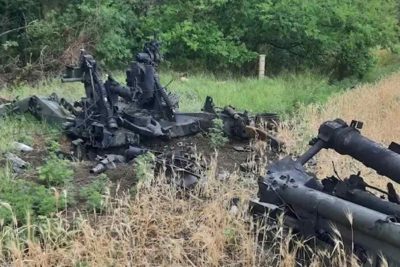Kiev Attacks Russian Airport with Possible Western Help

All Global Research articles can be read in 51 languages by activating the Translate Website button below the author’s name.
To receive Global Research’s Daily Newsletter (selected articles), click here.
Click the share button above to email/forward this article to your friends and colleagues. Follow us on Instagram and Twitter and subscribe to our Telegram Channel. Feel free to repost and share widely Global Research articles.
***
Kiev continues to promote terrorist maneuvers against civilian targets in the undisputed territory of the Russian Federation. On July 4, Moscow was the target of a new Ukrainian incursion with military drones hitting a major local airport. Russian forces were able to neutralize the terrorist threat in time to avoid disaster, however, there is evidence that Kiev received Western support to carry out the operation, which seriously increases the chances of escalation in the conflict.
On July 4, Ukraine launched an attack with unmanned aerial vehicles (UAVs) against Vnukovo International Airport in Moscow. Five Ukrainian drones reached the area of the airport but were neutralized without causing damage. Four UAVs were shot down by Russian anti-aircraft defense and one was diverted by techniques of electronic warfare.
The airport’s activities were suspended for a few hours in the morning due to security restrictions, but they were quickly resumed after the destruction of enemy UAVs, having virtually no impact in the flights’ schedule. It was reported by the authorities that the downed drones would have dropped in the regions of Kubinka, Valuyevo and Krivosheevo.
The raid was considered a terrorist action by Russian officials. Spokesmen for the Ministry of Foreign Affairs also pointed out that the complex nature of the operation makes clear the existence of Western aid. The US and other NATO members have not only provided Kiev with UAVs, but also extensive training in the use of these equipment, as well as intelligence information about the targets of the attacks and satellite images, which have facilitated the regime’s terrorist plans. For this reason, Russia considered NATO “complicit” in the July 4 attack.
Kiev, however, denied having any role in the incident. Indeed, denying responsibility in terrorist attacks has already become a common practice of the regime. Kiev’s modus operandi is to deny involvement immediately after cases and sometime later to make public statements that suggest responsibility. This was what happened, for example, in the case of the murder of Daria Dugina, in August 2022. At the time, Kiev denied involvement in the death, but months later the Ukrainian military intelligence chief General Kirill Budanov stated that his units would “keep killing Russians anywhere on the face of this world”, suggesting that Kiev was behind cases like the one of Daria.
This strategy of “postponing” and “suggesting without confirming” responsibility for the attacks helps the Kiev regime to maintain its image among Western public opinion. The mainstream media also play an important role in this game, as they work in strong disinformation campaigns, accusing Moscow of launching “false flags” to blame Ukraine. As citizens of western countries do not have access to Russian and pro-Russian media due to censorship, the tendency is for them to believe what is said by the big outlets, which leads them to endorse the support that their countries give to Ukraine.
However, the recent history of Kiev’s terrorist operations makes it very clear that there is Ukrainian responsibility for these assaults. The July 4 drones were just the latest in a huge wave of Ukrainian terrorist incursions into the undisputed territory of the Russian Federation. In recent months, neo-Nazi forces have launched several strikes against demilitarized civilian areas both in border oblasts and in the capital Moscow.
The most serious cases of these incursions in Moscow were the assassination attempt on President Vladimir Putin in the Kremlin in May, and the attack on residential buildings in the city later in the same month. Both incidents made clear the terrorist nature of the maneuvers that Kiev has been promoting in its alleged “counteroffensive”.
In fact, given their absolute inability to reverse the military scenario of the conflict, the Ukrainian forces have been betting on terrorism as a combat tool to keep active their propaganda that a “counteroffensive” is taking place. The regime has not enough strength to promote a large mobilization of troops on the ground and expel Russian soldiers from the liberated zones. Then, attacks are made against demilitarized areas and Russian civilian infrastructure.
Terrorism, from a technical point of view in military sciences, is the most primitive and poorest form of combat, used by armies in severe crisis and organizations without great military potential. Ukraine has become exactly that: an exhausted army, with no real fighting strength, but which is also forced to keep fighting in order to attend the interests of its Western sponsors. With no chance of victory in the regular war, it adopts terrorism as a combat method.
The Moscow airport attack shows how the so-called Ukrainian “counteroffensive” has been just a prolonged wave of terrorist attacks. This tends to lead to an escalation in the conflict, since the Russian State already has enough arguments to consider the Ukrainian State a terrorist organization and all NATO countries as state sponsors of terror.
*
Note to readers: Please click the share button above. Follow us on Instagram and Twitter and subscribe to our Telegram Channel. Feel free to repost and share widely Global Research articles.
Lucas Leiroz is a journalist, researcher at the Center for Geostrategic Studies, geopolitical consultant. You can follow Lucas on Twitter and Telegram.
Featured image is from InfoBrics

